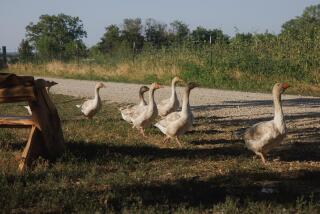AGRICULTURE AS DESTROYER
- Share via
I believe James J. Benson erred when he described farmer and hunter roles in his article, “The Writer Who Said What Hemingway Couldn’t” (Endpapers, April 9, 1989). Benson credited the farmer with husbanding resources and maintaining “an intimate relationship with the Earth and its creatures,” while intimating that the hunter must master the environment. Experience suggests just the opposite. The farmer, to succeed, must clear the land to make way for cultivation, divert waterways to irrigate, and rid the area of wildlife for the well-being of crops and livestock. The hunter, on the other hand, has to keep the wilderness intact because it sustains the game required for survival, and only kills what is necessary to eat as future meals depend on the continued existence of nature’s creatures.
In the settlement of the eastern half of the United States, for instance, Europeans came to farm, cutting down the forest so they could plant. Native Americans, the hunters, tried in vain to stop this destruction to save their sacred hunting grounds upon which they sustained their way of life. The conflict between farmer/destroyer and hunter/preserver persists, the struggle in the Amazon the best current example. In fact, it is fair to say that the ascendancy of sedentary agriculture over hunting and gathering many thousands of years ago began the acceleration of environmental scarring by our species that now threatens to destroy the Earth.
JOHN PERLIN
COMMUNITY ENVIRONMENTAL
COUNCIL
SANTA BARBARA


